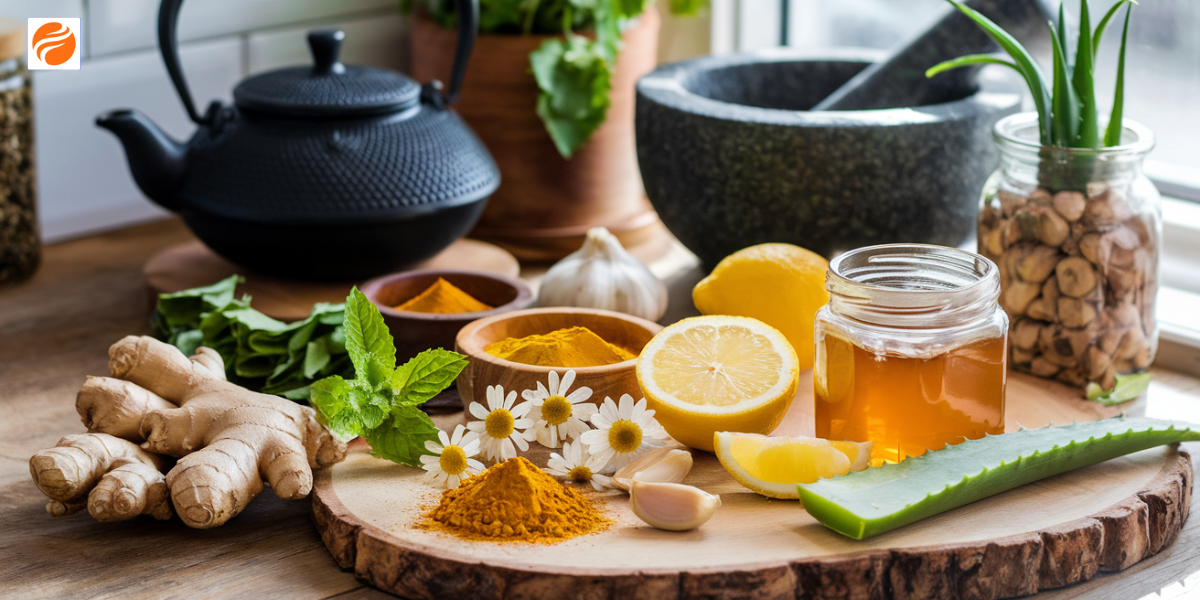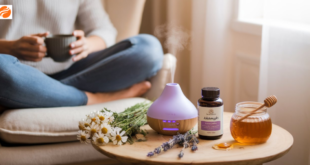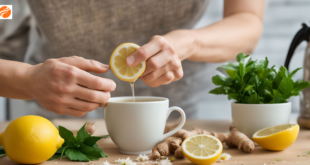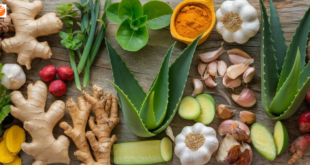
More people are embracing natural remedies as they look for safer, holistic, and cost-effective ways to treat common health issues. These remedies, derived from plants, herbs, and other natural resources, often come with fewer side effects than conventional medications and can be easily prepared at home. Below, we’ll take an in-depth look at some of the best natural remedies and how they can help alleviate ailments like digestive issues, headaches, inflammation, and more.
Also Read: Top 10 Home Remedies: Natural Solutions for Everyday Health Problems
Table of Contents
1. Ginger for Nausea and Digestive Issues
Ginger, a well-known culinary spice, has been prized in traditional medicine for centuries for its potent medicinal properties. Its primary active compounds, gingerols, and shogaols, are responsible for its anti-inflammatory and antioxidant effects. Ginger has been extensively studied for its ability to alleviate nausea, reduce inflammation, and aid digestion. It is particularly effective for treating nausea caused by pregnancy (morning sickness), motion sickness, and even chemotherapy.
How it Works:
Ginger improves gastric motility, which helps food move smoothly through the digestive system, preventing bloating and indigestion. Additionally, its anti-inflammatory properties soothe the stomach lining, reducing discomfort and nausea.
How to Use:
- Ginger Tea: Steep fresh slices of ginger root in hot water for 10 minutes, then drink.
- Ginger Chews: Chew on a small piece of raw ginger or use ginger candies.
- Ginger Supplements: Available in capsule or tablet form for those who prefer a concentrated dose.
2. Peppermint for Headaches and Muscle Pain
Peppermint is much more than just a refreshing herb. It contains menthol, a natural compound that provides cooling relief and helps to relax muscles. The soothing effects of peppermint oil make it an ideal treatment for tension headaches and muscle pain. It has been used historically to relieve headaches, migraines, and other types of muscular discomfort.
How it Works:
Menthol in peppermint acts as a vasodilator, meaning it helps relax and widen blood vessels, reducing the pain caused by tightness and restricted blood flow. It also has analgesic properties that can provide immediate relief when applied to the skin.
How to Use:
- For Headaches: Dilute peppermint essential oil with a carrier oil (such as coconut or olive oil) and apply it to the temples, forehead, and neck.
- For Muscle Pain: Massage diluted peppermint oil onto sore muscles for a cooling effect that reduces inflammation and pain.
- Peppermint Tea: Drinking peppermint tea can also help ease tension, especially if stress is the root cause of the pain.
3. Chamomile for Stress and Insomnia
Chamomile is one of the most ancient medicinal herbs, commonly used to treat stress, anxiety, and sleep disorders. The dried flowers contain terpenoids and flavonoids, which contribute to its calming and sedative properties. Chamomile is gentle and non-addictive, making it an ideal remedy for those who want to avoid pharmaceutical sleep aids.
How it Works:
Chamomile binds to certain receptors in the brain (like GABA receptors) that help promote relaxation and decrease anxiety, acting much like a mild tranquilizer. Its anti-inflammatory properties also help soothe the digestive system, which can be beneficial for those whose sleep is disrupted by indigestion or irritable bowel syndrome (IBS).
How to Use:
- Chamomile Tea: Brew dried chamomile flowers in hot water for 5-10 minutes. Drinking this tea before bed can calm your nerves and induce sleep.
- Chamomile Essential Oil: Add a few drops of chamomile oil to your pillow or diffuser for a calming scent that promotes relaxation.
- Chamomile Compress: For anxiety relief, soak a cloth in warm chamomile tea and place it on your forehead or neck.
4. Honey and Lemon for Cough and Sore Throat
The combination of honey and lemon is a time-tested remedy for sore throats and persistent coughs. Honey has natural antibacterial properties, which can help fight infections, while lemon provides vitamin C and helps break down mucus. This simple remedy can soothe throat irritation, suppress coughs, and provide immune support.
How it Works:
Honey coats the throat, reducing irritation and providing a soothing effect. Its antimicrobial properties can also help kill off harmful bacteria that might be causing a sore throat. Lemon, on the other hand, acts as an expectorant, breaking down mucus and making it easier to expel, which can reduce coughing.
How to Use:
- Honey and Lemon Drink: Mix a tablespoon of honey and the juice of half a lemon into a cup of warm water. Drink this mixture 2-3 times a day.
- Honey-Lemon Syrup: For a stronger cough remedy, combine honey and lemon with grated ginger for added anti-inflammatory effects.
5. Turmeric for Joint Pain and Inflammation
Turmeric is often called a “golden spice” for its bright color and remarkable health benefits. The active compound in turmeric, curcumin, has potent anti-inflammatory and antioxidant properties. It is widely used in Ayurvedic and Chinese medicine to treat arthritis, joint pain, and various inflammatory conditions.
How it Works:
Curcumin works by inhibiting inflammatory pathways in the body, blocking certain molecules (like NF-kB) that play a role in chronic inflammation. This makes turmeric particularly beneficial for those suffering from conditions like osteoarthritis or rheumatoid arthritis.
How to Use:
- Turmeric Tea: Boil turmeric powder in water, and add a pinch of black pepper (to improve curcumin absorption). Optionally, add honey for sweetness.
- Golden Milk: Mix turmeric powder with warm milk (dairy or plant-based), add a bit of black pepper and a sweetener of your choice.
- Turmeric Capsules: Available in supplement form for daily use. Make sure to select a high-quality supplement with added black pepper for better absorption.
6. Apple Cider Vinegar for Heartburn and Digestive Health
Apple cider vinegar (ACV) is a popular natural remedy for digestive health, particularly for treating heartburn and indigestion. Many people mistakenly think heartburn is caused by too much stomach acid, but in reality, low stomach acid is often the culprit. Apple cider vinegar can help increase stomach acidity, improve digestion, and prevent acid reflux.
How it Works:
Apple cider vinegar contains acetic acid, which can help balance stomach acidity levels and improve digestion by stimulating the production of digestive enzymes. It also has antimicrobial properties that can prevent harmful bacteria from causing digestive issues.
How to Use:
- Diluted ACV: Mix 1-2 tablespoons of raw, unfiltered apple cider vinegar in a glass of water. Drink this before meals to aid digestion and prevent heartburn.
- ACV Tonic: For an immune-boosting tonic, mix ACV with honey, lemon, and warm water.
7. Lavender for Anxiety and Sleep Disorders
Lavender is a powerful herb known for its calming and relaxing properties. It is commonly used in aromatherapy to reduce anxiety, stress, and promote better sleep. Lavender’s pleasant scent and natural ability to relax the mind make it a popular choice for those suffering from anxiety or insomnia.
How it Works:
Lavender contains linalool and linalyl acetate, compounds that have a calming effect on the nervous system. When inhaled or applied topically, lavender reduces stress hormones like cortisol and increases relaxation by influencing the parasympathetic nervous system.
How to Use:
- Lavender Essential Oil: Add a few drops of lavender oil to a diffuser or inhale directly from the bottle for anxiety relief.
- Topical Use: Mix lavender oil with a carrier oil and massage onto your wrists, neck, or feet to relax before bedtime.
- Lavender Bath: Add dried lavender flowers or a few drops of essential oil to your bath for a soothing experience.
8. Garlic for Boosting Immunity and Fighting Infections
Garlic is one of the most powerful natural antibiotics and immune-boosters available. Its active compound, allicin, has strong antimicrobial, antiviral, and antifungal properties, making it an effective remedy for fighting infections and supporting immune health.
How it Works:
Allicin, formed when garlic is crushed or chopped, is responsible for most of its medicinal benefits. It enhances the body’s immune function by stimulating the activity of white blood cells and helping the body fight off pathogens.
How to Use:
- Raw Garlic: For maximum benefits, crush a clove of raw garlic and consume it on an empty stomach.
- Garlic Supplement: If raw garlic is too strong for you, garlic supplements are widely available in capsule form.
- Garlic in Cooking: Adding garlic to your daily meals can help keep your immune system strong.
9. Aloe Vera for Burns and Skin Irritations
Aloe vera is widely known for its skin-soothing and healing properties, especially when it comes to treating burns, cuts, and other skin irritations. The gel from aloe vera leaves contains compounds that reduce inflammation, promote healing, and hydrate the skin.
How it Works:
Aloe vera contains polysaccharides, which promote the repair of damaged skin, and glycoproteins, which reduce inflammation and swelling. The cooling effect of aloe makes it particularly useful for treating sunburn and minor burns.
How to Use:
- Aloe Vera Gel: Apply fresh aloe vera gel directly from the plant to burns, cuts, or irritated skin.
- Aloe-based Creams: Use store-bought aloe vera lotions or gels for long-term skin hydration and healing.
10. Echinacea for Colds and Immune Support
Echinacea is a flowering plant commonly used to strengthen the immune system and combat colds and flu. It’s known for reducing the severity and duration of symptoms like a runny nose, sore throat, and fatigue.
How it Works:
Echinacea boosts the immune system by increasing the production of white blood cells, which helps the body fight off infections. It also has anti-inflammatory properties that can help reduce the symptoms of respiratory infections.
How to Use:
- Echinacea Tea: Drink echinacea tea daily during cold and flu season to prevent infections.
- Echinacea Supplements: Available in capsule, tablet, or tincture form for easier consumption.
Conclusion: Nature’s Healing Power at Your Fingertips
Natural remedies offer a safe, effective, and often inexpensive way to treat many common health issues. By incorporating these home treatments into your daily routine, you can support your overall well-being and potentially reduce the need for over-the-counter medications. Always remember, though, it’s essential to consult with a healthcare provider before using natural remedies, especially if you’re dealing with a chronic condition or taking medications.
for more info click here
FAQs
1. Are natural remedies safe for everyone?
Most natural remedies are safe for general use, but certain individuals—such as pregnant women or those with chronic health conditions—should consult a doctor before using them.
2. How long does it take for natural remedies to work?
The effectiveness of natural remedies varies depending on the individual and the condition being treated. Some remedies may offer immediate relief, while others could take days or weeks to show results.
3. Can I use natural remedies alongside prescription medications?
In many cases, natural remedies can complement prescription treatments, but you should always consult your healthcare provider before combining them to avoid any potential interactions.
 Health live a Healthy life
Health live a Healthy life







